

Avoiding Flawed
Demonstrations:
Greenhouse Effect
Intro/Index
Faulty Demos
Errors, Misconceptions
Testing, Lab Results
Scientifically Strong
Resources
Rebuttals
Acknowledgements
Contact
_______________
Testing them out:
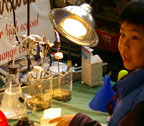
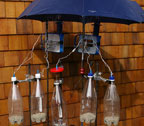
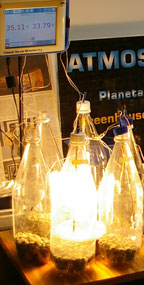
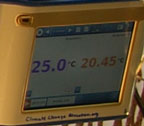
Students, teachers, and
scientists working
together
have been
reproducing and testing
these demonstrations.
They have been
recording results,
identifying flaws, and
dissecting the errors.
Experience in reproducing
flawed experiments has
been an advanced
learning
experience.
Knowing well what NOT
to
do is very helpful in
developing ever better
approaches and sound alternatives in hands-on
climate science.


Scientifically Sound
Demonstrations
This web portal
is a resource within
America's online library
for Education &
Research
in Science,
Technology,
Engineering,
Mathematics:

|
|

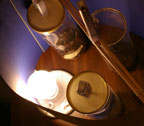
| 
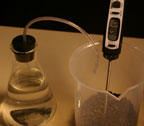
| 
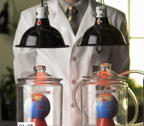
| 
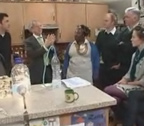
| 
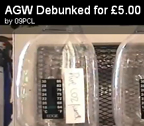
| 
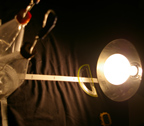
| |
Do demos like these accurately and effectively demonstrate the
greenhouse effect; how global warming works? Do they demonstrate what they claim?
|
Introduction: Avoiding Flawed, Problem Science Demonstrations -- Greenhouse Effect in a Bottle; Heating Carbon Dioxide vs. Air.
In the United States, one class of science demonstration on global warming & the greenhouse effect is now being promoted by powerful sponsors above all others.
These need to be addressed, as sound scientific guidance has been lacking. Teachers and parents are frequently writing us and coming up to us in person,
asking
for
help. They are not getting the test results they have been instructed to obtain. Are these demonstrations valid scientifically? Are some cleverly designed
to promote doubt in climate science? Why are educators
being directed to focus on these demos and to not employ others that have been very well vetted?
We are hearing from education programs around the world,
"What is up with these demonstrations being pushed in America?"
Beginning twelve years ago, ClimateChangeEducation.org founders explored many demonstration designs in the laboratory. We recognized that
demos of this nature
have fundamental flaws, and have regularly discussed this with fellow educators. We are engaged in continued, practical development
of a rich array of hands-on demos that explore climate change science from
many angles and on many dimensions. Most are very inexpensive, are easy to reproduce, align well with
school content standards, and are not difficult to learn to
present -- given teachers are afforded hands-on experience. Science accuracy
must always be first
and foremost (along with safety). From there, let us work to make
demos as inexpensive and accessible as possible.
If the primary driver is to be
cheap, simplistic
and
easy; what are we saving in public education if the product is essentially
fake science?
When major education institutions only promote what their wealthiest sponsors direct them to use, without public and scientific scrutiny, are there no risks?
We network with scientists, education programs, artists, engineers and students
across
the US and around the world.
Many other education
programs had tested these demos; and like us, concluding that they do not work as claimed.
We have shared
findings among colleagues, comparing notes on flaws; making
recommendations on what error riddled resources are best to avoid.
We alerted many promoters of these flawed demos of our findings and offered to share our test results on a pro-bono basis.
We have
continued to test and evaluate new versions of the same basic design as they have appeared, each claiming validity.
It is past time: these must be addressed on whole.
It isn't enough to issue caveats privately any longer. Thus, we are publishing these web pages publically.
Throughout history, demonstrations have played a forceful role in resolving major controversies in society.
Hard
evidence -- testable, widely reproducible, accessible -- packs tremendous power, as it should.
Eratosthenes, Alhazen, Galileo, Isaac Newton, Charles Darwin, Louis Pasteur, John Tyndall, Wright Bros, Marie Curie, The Manhattan Project, Neil Armstrong
-- without public demonstrations, would the power of their discoveries have been believed; would society have taken them seriously?
Today, with climate change, it is essential to insist on hands-on science that is both dramatic and scientifically sound. Divining rod demos will not do.
Making basic climate science demonstrations available now can help prevent mass destruction, misery, suffering, and financial losses.
Quality demos presented now are fun, exciting, informative, inspiring and empower the public to mobilize to solve problems.
We needn't wait for nature to provide all the demos for us; as the opportunities to act on the science continue to pass. Those demos would be no fun at all.
Where museums, aquariums, schools or mobile programs do not provide vetted labs and the opportunity for hands-on investigation and experimentation,
then it could be argued: perhaps authentic quality public science education is absent in your city/area/region.
Science demonstrations are extremely powerful. Good ones, based on sound evidence, are very persuasive. Bad ones, widely promoted, are very destructive.
It has been from the ground up that the demand for quality, engaging hands-on science has been generated. Survey results have consistently emphasized: what
teachers, parents and kids ask for most by far in learning materials on global warming and climate change are hands-on demonstrations and activities.
For decades,
major sponsors
have emphasized top down scripted messages in public communication on climate change.
Major sponsors include: corporations and industry lobbying groups, national environmental organizations, government agencies and wealthy benefactors.
More recently, poweful sponsors have recognized the strong public demand for hands-on climate change education, knowing that control of content is not possible
without investment. Carefully selected and developed demonstrations they regard as the most suitable for the eyes of the American people are being promoted.
We ask that you share with us your analysis on this question: When major sponsors have spent hundreds of millions of dollars on communications to the public
about climate change; why are such cheap, sloppy, and unscientific demonstrations now being advanced?
Why flood the field with an array of such contaminated, scientifically faulty demos?
Here, we will offer both science theory and practical lab & field experience -- to help educators make their own assessment of this type of demonstration.
These webpages are developed in consultation with scientists in numerous disciplines, formal and informal educators, engineers, parents and kids/scientists.
On a positive note: there are many great science demos available worldwide. Flawed demos, too, have a value as teaching tools in catching errors and deceit.
Can your students find the errors? It will require that they become really good at climate and investigative science to do so. Are they up to the challenge?
|

Examples of Faulty Demonstrations
|

What these problem demonstrations
typically
get wrong
| 
Quality hands-on science is essential.
There is no need to fake it. Let's get it right.
|
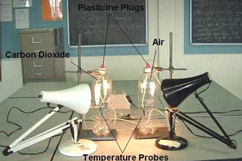
Typical layout (with many variations)
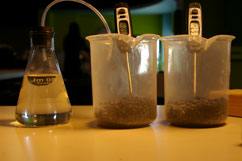
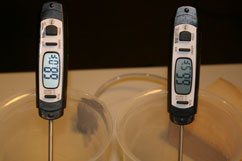
Developed by energy industry sponsored programs;
aquarium & science museum staff paid to present.
Sponsors of above design include:
BP, Chevron, Halliburton Foundation, KBR, Shell,
Society of Petroleum Engineers

Keystone Center's Climate Science Investigations.
Too Cool for School -- The Greenhouse Experiment Professional development workshops at conferences.
Above: promoted at
California Science Teachers Association conference.
Sponsors include: BP, Chevron Texaco, General Electric,
& American Petroleum Institute.

Climate science denial websites are expressing
great pleasure
that these demos are being advanced.
Using the demos to "debunk AGW."
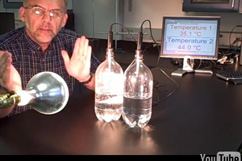
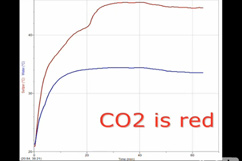
Some United States government programs
are now
promoting their own versions.
Example above: CLEAN

Recently joining in:
Bill Nye & Al Gore's Climate Change 101 demo

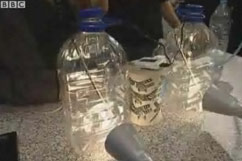
Covered in television news & science stories.
One of the reasons these webpages are being published is
to proactively encourage
programs with integrity to make
corrections in
the
menu of science demos they are
promoting. It is possible to avoid this becoming the
subject
of an
international media scandal.
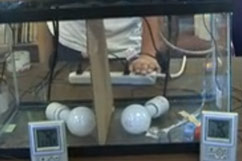
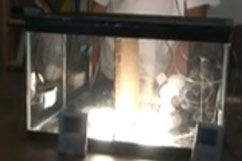
With climate scientists being discouraged from
acting as
advisors for public education programs,
and punished if they do,
unvetted teaching tools spread.
Example of on-line videos
produced by outreach programs.
| 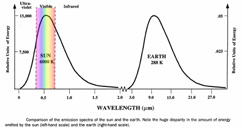
Fostering misunderstanding of basic
climate science.
e.g. most demos get the above wrong.
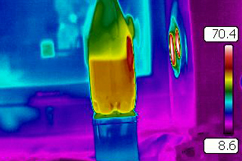

Promoting assumptions that what exists is only what
one can see with the naked eye. e.g. that you can
determine the essential properties of the materials, selected for use in IR experiments,
just by looking at them.
Above:
PET plastic water
bottle viewed in long and short wave IR.
For carbon dioxide heating, PET is not "clear" at all.
Industry understands well the properties of common plastics & CO2, yet is promoting such misinformation.
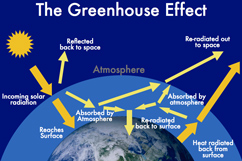
Attempts to mash several steps/phenomenon
into one -- resulting in a confused, mistaken view
that doesn't hold up under lab scrutiny.
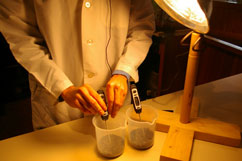
Promoting very poor fundamental lab
and experimentation
techniques. e.g. Above:
Comparing temperature rise after equal energy input??
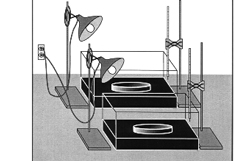
Not accounting for other
properties
of carbon dioxide at high concentrations.
e.g. ability to form a convection lid
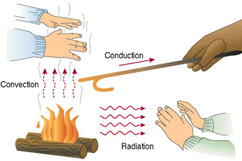
Heat energy transfer takes three basic forms.
Do presenters know, or do participants learn to recognize, the difference?
Global warming
happens essentially through one form. In most of
flawed demos, the other two
are driving
much of the process.
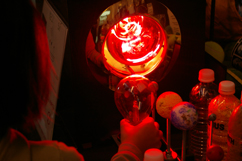
Small difference in distances from nearby strong
energy sources
produce large temperature differentials --
much
stronger than effects of gas content in containers.
Silver lining: students enjoy demonstrating this, as above,
as they discover the deception in trick demos.
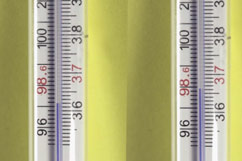
Signal to noise ratio. How strong is the signal we seek? How strong is the noise in our experiments? How weak a signal can still be accurately measured with specific lab equipment and technology?
Are test results really contrary to theory?
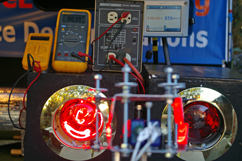
Output of incandescent lamps are rarely equal,
if not matched by dimming calibration.
Differentials can produce errors of several degrees C.
Illuminance/voltage lab pre-adjustment shown above.
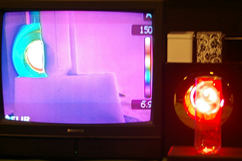
Major sponsors have blocked efforts to allow the public to have new exciting experiences. e.g. exploring the world where
carbon dioxide dances with energy.
Where the visible and invisible trade places and the
greenhouse effect materializes.
The feeling is magical, but this is real climate science.
Quite different from fake-science magic trick demos
schools are being paid to present.
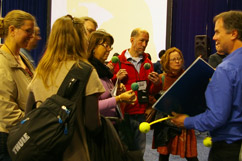
Feedback we regularly get from teachers, parents
and students: these flawed demonstrations have a
strong effect in sowing doubt in the validity of
climate
science.
They do not demonstrate what they claim.
They leave students confused and misinformed.
Dramatic results are acheived by presenter bias.
Many versions can just as easily be used as a tool
to "demonstrate
that global warming is a hoax",
by essentially using
slight of hand. Why are
teachers are being blocked from using valid demos?
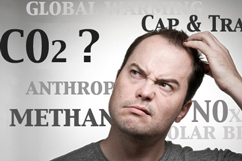
Many of these scientifically faulty demos are
proving to be VERY successful --
if their goal is to spread confusion,
doubt and mistrust in climate science.
These demonstrations are promoted as representations of
the basic understanding of climate research scientists.
But are they?
Demonstrations developed by actual climate scientists
and experienced hands-on climate science education
specialists
are being discouraged by major funders.
Demonstrations developed by energy corporations and
government staff are selected for promotion campaigns.
When scientists and educators have offered
constructive feedback, pointing out flaws,
it has been
almostly entirely ignored.
Is this proper vetting of educational content?
How did this happen?
Is it plausible that major sponsors do not know the
demonstrations they are promoting are unscientitic?
Is it right to spread disinformation to children & parents?
Is it appropriate to represent climate scientists
with such distorted models of their research findings?
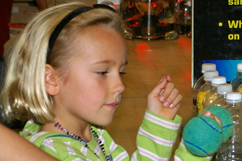
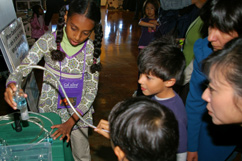
What would happen if real evidence and scientific
tools
got into the hands on of millions of kids?
Enthusiast, involved, motivated students,
eager to succeed, preparing for college.
Testing, challenging, questioning, verifying:
What is real; what is fake? What really works?
Now, able to communicate scientifically,
having had actual hands-on experience.
Leaders presenting
science demos themselves:
to their peers, parents, grandparents, everyone.
Does that sound too much like democracy?
Not enough message control from above?
|
Iain Stewart's excellent on-line video
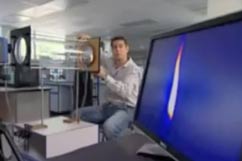
The Mobile Climate Science Labs

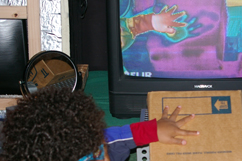
Scientists understand global warming & the greenhouse
effect as happening through a series of connected steps.
Not in just one step.
Students can test and
experience these steps: they are real ...and happen every
time. Existing state science content standards actually
provide a decent foundation for grasping climate change
science as children grow and learn. Unfortunately, these
standards are rarely taught -- especially in the ways that scientists themselves make & test discoveries. Hands-on.
The fun way to learn. And the rewarding way to teach.
Professional Development for Educators 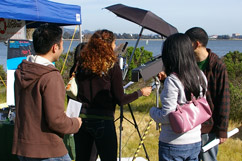
Exploring the sun's spectrum, then the Earth's. Each are made up of several bands of energy at different wavelengths. To teach hands-on science well
requires real world hands-on experience.
Year-round in the field teacher professional development.
Carbo Schools / Carbo Europe
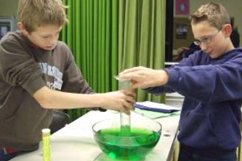
American Association for the Advancement of Science
Birch Aquarium
University of California, San Diego

Scientifically sound demos that really work.
True hands-on exhibit: Feeling the Heat
Lawrence Hall of Science:
Global Systems Science & NASA's Lifelines
for High School Climate Change Education
Hands-on climate science engaging
hundreds of thousands--at least in California.
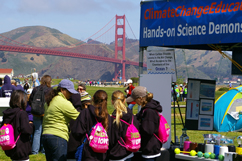
Public access to scientific tools, testing the evidence.
Not more political messaging, telling the public what
they are supposed to think and do.
Girl Scouts; Boy Scouts of America Events
Bay Area Science Festival
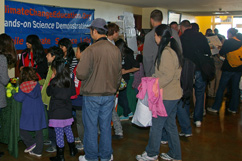
The difference in human response to participatory,
hands-on science and watch-only content is enormous.
Share control, test, verify, touch, repeat the experiment,
encourage creative variations
-- No tricks here!
At least have peer participation during TV broadcasts.
Do you care much about topics in which you have never
had involvement? Where climate science is for just a few,
detached elite scientists, and the public's role is reduced
to be information sponges obediently following
government
policy and messaging,
how seriously will global warming
really be taken in the decades ahead?
Excellent government sponsored hands-on programs. e.g.: NASA Climate Day Events (California)
California Climate Change Conference
San Francisco Sunday Streets
Students investigate, dissect flawed demos
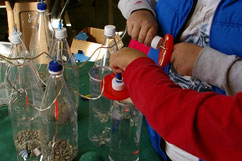
Students test flawed demos, discovering the many ways
presenters can force the temperature readings they want
to emerge. The flawed demos are indeed "really easy"--
i.e. easy to introduce experimental error and bias.
Kids love being the detectives: revealing bad science.
They then are better able to appreciate real climate science.
Contributing to climate science knowledge

Reproducing the flawed demos provide great learning
opportunities. Students/kids, parents and teachers: gain
critical thinking skills; develop their baloney detectors.
Look for flaws, helping their peers to understand. As
engineers, they help design scientifically sound demos.
In doing this, kids have already contributed to climate science!
They are active and involved -- not content to be
simple sponges for scripted information.
Dozens of popular, vetted labs and demos
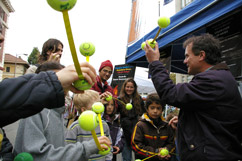
Carbon dioxide's dance with energy.
Demos kits for two dollars each.
The issue was never one of cost or scalability.
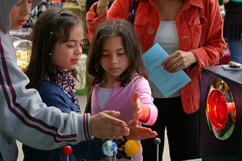
Feeling incoming solar radiation of different planets.
Every world has an energy budget, shifting temperatures.
The largest factors: their orbits and their atmospheres.
Continually designing & testing new demos
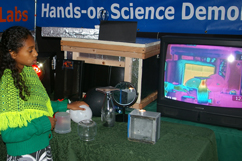
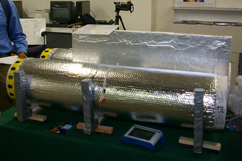
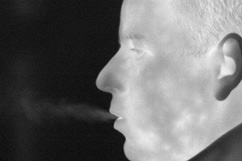
Working to develop additional new demos that are
safe, scientifically sound, powerful, reproducible,
accessible and fun.
When possible, inexpensive.
Black and white image: thank you, Flir.
Television news and science program coverage
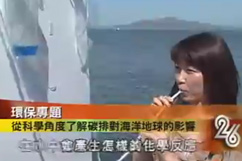
TV News -- with a large local and international audience.
Some phenomenon are easier to present in demos than
others. This one is of the basic mechnanism of ocean
acidification. A brief, edited segment on the evening news.
|
|























































